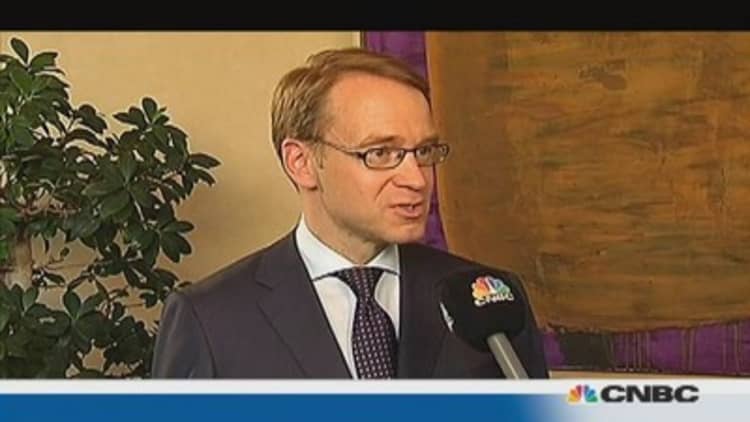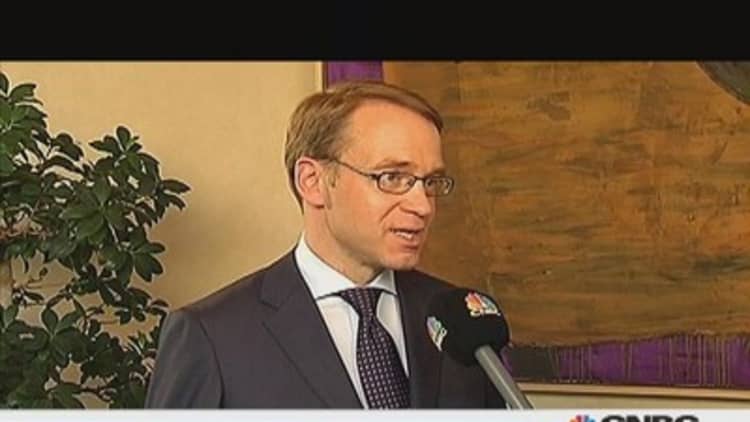
Euro zone governments must persist with their economic reforms as geopolitical risks loom, the president of Germany's Bundesbank, Jens Weidmann, has told CNBC.
Speaking following the publication of the central bank's annual report on Thursday, Weidmann said Europe's economic recovery was "a marathon."
"We should continue these efforts to adjust - these structural reform efforts - and we should not diminish them," he said. "There are risks - for instance geopolitical risks - that could also reflect on financial markets, but I will not forecast financial market reaction to that."
In its annual report, the Bundesbank called on the European Central Bank (ECB) to remain focused on inflation in the euro zone,as it reported a seven-fold hike in profit.
(Read more: Euro zone inflation tops forecast)
The ECB needed to be "unambiguously focused on the primary objective of ensuring price stability" in the 18-country currency bloc, the central bank said.
It comes amid lingering concerns about deflationary pressures in Europe, with euro zone inflation coming in at 0.8 percent in February – significantly lower than the ECB's "below, but close to, 2 percent" target.
The central bank also said profit for 2013 came in at 4.6 billion euros ($6.4 billion) - much higher than expected – as it did not need to transfer any more funds into a risk provisions pot, which now stands at 14.4 billion euros. It compares with profit of just 664 million euros in 2012.
Although it warned that lower key interest rates meant the Bundesbank was likely to post a smaller profit in 2014.

Despite deflationary worries, however, the ECB kept its monetary policy unchanged at its March meeting - a decision that Weidmann defended.
"We do monetary policy for the euro area as a whole and not for single countries," he said. "We just decided at our last meeting that our monetary policy stance was appropriate given our new projections and our assessment of inflation developments."
At the meeting, ECB President Mario Draghi downgraded the ECB's inflation outlook for 2014 to 1.0 percent, from the 1.1 percent forecast at the end of last year.
With regards to monetary policy tools looking ahead, Weidmann expressed reservations about purchase programs of sovereign bonds, which he said redistribute solvency risks between the taxpayers of different countries.
"This could undermine the institutional framework of the euro area and it also poses legal problems," he said, but added: "This does not preclude asset purchase programs more widely, and this is an ongoing debate in the Governing Council."
(Read more: Eurozone's surprise growth boosts recovery hopes)
Germany's challenges
The Bundesbank said Germany's economy - the largest in Europe - looked likely to grow further both this year and next.
Its annual report said the country's domestic activity was bolstering sustainable growth, as demonstrated by the country's comparatively low unemployment rate, rising employment and an increase in wages.
"These factors, combined with the low level of interest rates, were fueling housing construction, in particular," the report said.
But Weidmann stressed that challenges "do exist and are quite considerable" for the Germany economy.
"We will face huge demographic burdens. We also - like everybody else - face the challenges of globalization, and we have also a high debt level that will have to be reduced," he told CNBC. "We should not forget these when we discuss the other challenges other countries face."
Follow us on Twitter: @CNBCWorld


